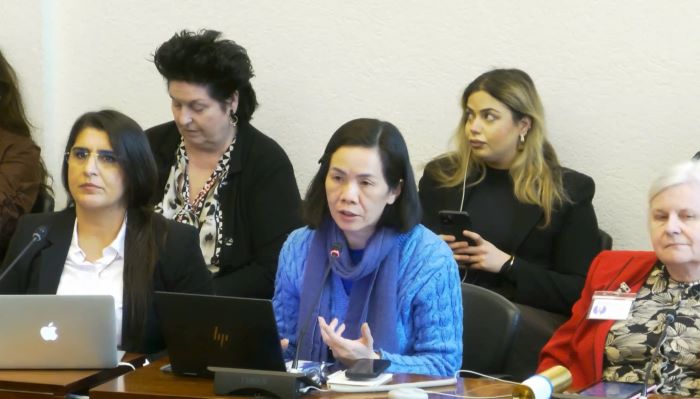Children with disabilities find outlet in drama
Because Nguyen Thi Duyen, 13, was born with hearing impairment, she cannot speak and had never acted in a play, until now.
Nor had she ever been so happy, Nue said.
"She used to be so shy. I never thought she could take part in such activities," she said.
"But now I see that she has the confidence in herself. And I am so touched."
Looking modest on the stage, in a white shirt and dark trousers, Duyen did not know her mother was crying. She was just having the most memorable night of her life after two weeks of rehearsals.
"It was so great. I wish I had days like this every week, every month," Duyen said in sign language.
Only two weeks ago, she could not even imagine being part of the show.
Duyen and 59 other hearing impaired children aged 10-15 attend the Dak Lak Support Centre for Development of Inclusive Education for Children with Disabilities.
They got the chance to participate in the two-week programme, co-organised by the Medical Committee Netherland Viet Nam Organisation and the centre.
The programme aims at improving the self-awareness and capacity of youth with disabilities to maximise their potential through drama.
The idea of using theatre activities to help improve confidence and communication skills came from Netherland artists.
"Art in general and drama in particular is always a good means for anyone to speak out their thoughts and wishes," said Joop Hoekstra, a drama teacher who helped in the project.
"Theatre techniques are strong tools to open participants’ minds and hearts," he said.
Hoekstra worked with four students of the
Hoekstra worked hard during his two weeks in Buon Ma Thuot City to prove his theories.
Instead of giving the children a scenario and make them act, Hoekstra encouraged them to speak their thoughts. After creating a friendly and humourous atmosphere with many games, he asked them to have a "sharing day".
Nguyen Huu Phong, 12, told the group his story for the first time.
He is the only one of his parents’ four sons who cannot hear and speak. once, his father arrived home drunk and called out for him, having no idea his son could not hear. Getting no answer, the drunken father hit Phong and forced a burning cigarette against his arm, leaving a scar which he showed to his audience.
Do Anh Xuan, 13, said that when his mother was pregnant, his grandmother did not want her to have the baby and tried to force the parents to abort it. They did not obey and after he was born, his grandmother expelled her mother and him from the house.
Until now his grandmother refuses to acknowledge him as her grandson.
Many other similar stories were told, causing the children to know more about their friends’ lives, bringing them closer together.
From those tales, groups of 20 students were asked to construct their own scenario for a play.
"What could be better understood than scenes from the children’s own stories?" Hoekstra said.
With the help of centre teachers in communication with hearing impaired children, Hoekstra and other four students gradually helped the children speak out and think and act in pantomimes in which they were the stars and the characters.
One of the volunteer students, Nguyen Hoai Son, said the children learned through discussing and debating with one another.
"They were all always able to come up with a solution," Son said.
The programme ended with a performance of the two plays the children had produced. There also were songs played by visually-impaired children and several dances by hearing-impaired children.
The plays and dances drew tears from many in the audience, knowing that the children could not hear the music to which they were dancing, but they still danced with the utmost enthusiasm.
But the programme was not only about performance, centre director Bui Xuan Tien said.
"Many of the children were very timid and silent in the first days of the programme," Tien said. "But then they all became involved in the activities.
"It’s not only necessary to provide disabled people with medical or financial support, but also with social skills so that they can find their self-esteem and their position in the society," he said.
Drama classes were part of the project for the empowering of disabled youth through creative arts and theatre, run by the Medical Committee Netherland-Viet Nam Organisation, which has been going for two years in Cao Bang, Quang Tri, Phu Yen and Dak Lak provinces. Apart from drama, children also take part in painting activities.
The country now has some 1.2 million disabled children, of which more than 46 per cent have not completed primary education.







